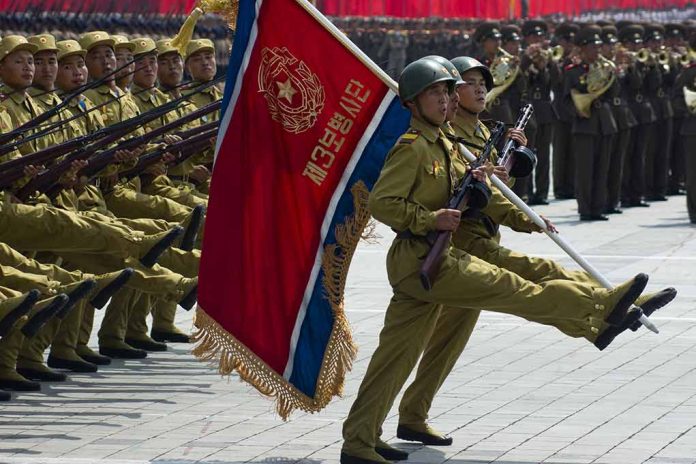🔴 Website 👉 https://u-s-news.com/
Telegram 👉 https://t.me/usnewscom_channel
In a conflict already fraught with tragedy, the deployment of North Korean soldiers to Ukraine highlights a disturbing new chapter.
At a Glance
- Two North Korean soldiers were captured by Ukrainian forces.
- North Korean troops are reportedly committing suicide to avoid capture.
- North Korea’s first large-scale military involvement since the Korean War has resulted in significant casualties.
- Reports indicate a lack of preparedness among North Korean soldiers for modern warfare.
North Korean Troops in Ukraine
The involvement of North Korean soldiers in Ukraine marks a drastic shift in the ongoing conflict. The first captured North Korean prisoners of war (POWs) by Ukraine reveal troubling insights. These soldiers were deployed under the impression of a training exercise without knowledge of an active conflict. This situation raises questions about the moral and strategic implications of their involvement without full awareness and preparation.
Recently, reports emerged that the soldiers have resorted to suicide rather than face capture, driven by fears of reprisal against their families. This development underscores the immense pressure and dire conditions under which these troops operate. Western intelligence suggests these soldiers are unprepared for the complexities of this war, struggling with modern warfare elements like drones while facing harsh treatment from Russian commanders.
North Korean troops told to choose suicide over capture in Ukraine: Seoul https://t.co/GDRfMLdZ0w
— Andy Sharp (@sharp_writing) January 13, 2025
Zelenskyy’s Approach to Captured Soldiers
Ukrainian President Volodymyr Zelenskyy has stated a potential willingness to exchange the captured North Korean soldiers for Ukrainian prisoners held in Russia, should North Korean leader Kim Jong Un agree. According to President Zelenskyy, one soldier expressed a desire to remain in Ukraine, whereas the other wishes to return to Korea. This willingness for exchange highlights diplomatic efforts amidst a highly volatile situation.
“Suppose Kim Jong Un remembers these citizens of his and is capable of organizing an exchange for our warriors being held in Russia. In that case, we are ready to transfer such soldiers. Undoubtedly, there will be more POWs from North Korea.” – Ukrainian President Volodymyr Zelenskyy
This recent turn in the Russia-Ukraine conflict, with North Korean soldiers in the mix, brings significant risk of further escalation. The estimated deployment of around 11,000 North Korean troops in support of Russia depicts an internationalization of the conflict that challenges peace and security on a broader scale. North Korean presence is perceived as both a tactical maneuver by Russia and a potential future threat, should Pyongyang gain combat experience and technology.
The Human Cost
The ongoing conflict has resulted in significant losses for North Korean soldiers, with reports indicating over 300 fatalities and 2,700 injuries. The deployment marks North Korea’s largest military campaign since the Korean War. Ethically troubling orders discovered include instructions for soldiers to commit suicide rather than be taken prisoner, a grim reflection of the high stakes and brutal conditions they face.
“North Korean troops are being treated as “expendable” and ordered to take on “hopeless assaults against Ukrainian defenses,”” – National Security Council official John Kirby
South Korea’s spy agency estimates the North Korean military has suffered over 3,000 casualties while fighting against the Ukrainian forces. It has also found memos showing Pyongyang urging its soldiers to commit suicide before being captured.https://t.co/v8WUpZfjB0
— Hyunsu Yim (@hyunsuinseoul) January 13, 2025
The reports paint a grim picture of North Korean soldiers’ situation under Russian command: expendable lives sent into hopeless battles with insurmountable odds. The harrowing accounts of suicides, orders to self-eliminate, and brutal repercussions contribute to the tragic human loss in this geopolitical conflict.
